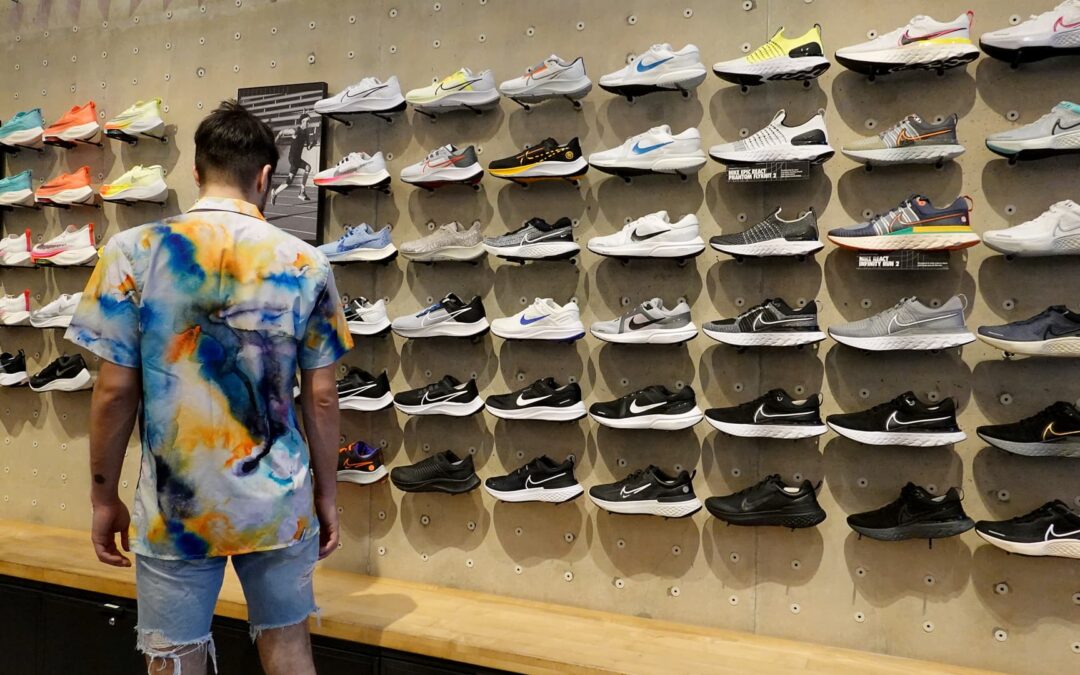A customer shops at the Nike store on December 21, 2021 in Miami Beach, Florida.
Joe Raedle | Getty Images
Teens are a notoriously fickle bunch — but the group is also often on the leading edge of many trends the rest of us eventually adopt.
In many ways, the cohort’s spending habits reflect those seen in the U.S. at large.
Teens’ self-reported annual spending is down 1% to $2,316 compared to last fall, and down 4% from the spring, according to Piper Sandler’s biannual teen survey released Tuesday. Interestingly, male teens report spending 11% more than last fall, while females are spending 8% less.
High prices appear to be weighing on teens as much as they are on other age groups in the U.S.: when asked about the biggest political and social issues today, inflation was second behind the environment. The economy was fifth.
When teens are spending, 37% said they are using funds earned from a part-time job, while 62% said parents contribute to spending.
One company reigned among teen spenders. Despite a rocky financial performance recently, Nike remains the favorite brand for apparel and footwear for both male and female teens for the 12th year running in the survey that has been conducted for 22 years. Other fashion and beauty brands have been moving around in preference during that time.
Clothing and apparel spending falls
Teens are spending 4% less on clothing compared with last year, down to $563 per year. Females are outspending males by about $180, slightly less than the difference in the spring version of the survey.
After Nike, American Eagle and Lululemon are the second and third most preferred brands among teens, the same as in the spring. While Shein moved up to the No. 4 spot from No. 5, overtaking H&M, the company’s market share fell by 1 percentage point.
Teens are also putting less money into footwear. Spending dropped 3% to $305 a year. Males outspend females on shoes by about $80 a year.
Converse held the second most favorite brand spot behind Nike, but dropped in market share by 1 percentage point. Adidas held the No. 3 spot, and New Balance gained 2 percentage points of market share to become the 4th favorite brand. It surpassed Vans, which lost share and fell to 5th.
Crocs and Crocs-owned Hey Dude come in 6th and 7th, respectively. On Running emerged in the top 10, claiming the No. 8 spot. Birkenstock, which is set go go public this week, did not make the top 10, and hasn’t for at least the last 4 surveys.
Teens are shopping more at off-price retailers like T.J. Maxx, Ross Stores, Marshalls and Nordstrom Rack, as well as online. They’re buying less at specialty stores, discounters like Target and Walmart, outlets and secondhand options.
Amazon dominates as the online shopping site of choice. Shein comes up 2nd, but with just 7% of share compared to Amazon’s 59%. StockX and Temu moved into the top 10 after not making the list in the spring. Princess Polly and GOAT fell out of the top 10.
When teens were asked what the top fashion trends were in school, “leggings/lululemon” held the top spot for females as it has for at least the last four surveys. It was followed by crop tops and jeans at No. 2 and No. 3, respectively. They rose from the No. 4 and No. 5 trend in the spring, as UGG Australia boots dropped from 2nd most named trend for females to 6th. “Baggy/saggy pants” were the 5th most named trend for females.
When asked about top trends, males named “Nike/Jordans” as No. 1, as they have for at least the last four surveys. Athletic wear was 2nd, and “baggy/saggy pants” was 3rd for male fashion trends. Hoodies fell to 5th from 2nd in the spring, and short shorts popped up at No. 9 as a top trend for males in school.
Beauty booms
Teens are spending $324 a year on beauty, up 23% from last year. The jump was led by a 33% increase in cosmetics, marking the highest spending level in the category since 2019.
In cosmetics, e.l.f. remains the top makeup brand, and gained in share from the spring and last year. Selena Gomez’s Rare Beauty held the No. 2 spot and gained share over last year. Maybelline held the 3rd spot.
Skin care spending grew 19% over last year, and CeraVe was the top skin care brand, The Ordinary, owned by Estee Lauder, comes in 2nd and L’Oreal-owned La Roche-Posay gained two spots to No. 3.
Fragrance spending, meanwhile, grew 14% over last fall. Bath & Body Works is No. 1 in the category, but its market share fell 7 percentage points from last year. Hair care spending increased 5% from last year. Olaplex was the favorite brand, though it held the lowest share seen in this survey.
Teens are shifting where they buy beauty. Sephora unseated Ulta as the top destination for beauty for the first time in five years. Both Sephora and Ulta have shop presences within other major retailers’ stores, at Kohl’s and Target, respectively.
Target, Amazon and Walmart make up the top five in the beauty category. T.J. Maxx made the list at No. 10 for the first time in at least the last four surveys.
Methodology: Piper Sandler’s survey results come from answers from nearly 9,200 teens with an average age of 15.7 years old, surveyed in 49 U.S. states with an average household income of $70,725.









